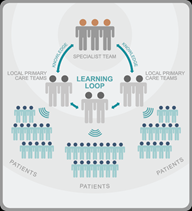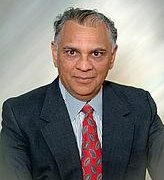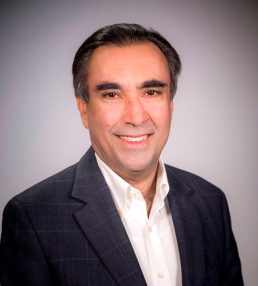PROJECT ECHO
Project ECHO
Project ECHO (Extension for Community Healthcare Outcomes) is a groundbreaking healthcare intervention that uses readily available videoconferencing technology to offer telementoring programs designed to build workforce capacity for screening, diagnosing, and providing complex care to vulnerable patients in rural and underserved areas. ECHO addresses existing disparities in access to care by moving specialized medical knowledge, not people, from urban medical universities and tertiary care centers to primary care practices serving marginalized and resource-constrained communities.
Project ECHO, founded in 2003, is the brainchild of Sanjeev Arora, MD, is the founder and director of this innovative global health delivery system. The ECHO platform operates in more than 45 countries, covering over 70 complex medical conditions/diseases and education. ECHO has developed processes, training curricula, and software resources to support replication initiatives worldwide. It is a revolutionary guided-practice model that reduces health disparities in under-served areas through modern telementoring to reach 1 billion lives by 2025.
Under the leadership of Dr. Kumud Rai as Chairman and Dr. Sunil Anand as Executive Director, ECHO India has come a long way with 117 completed programs and 49 more in progress to date. These programs cover over 20 focus areas such as cancer screening, palliative care, mental health, liver disease, tuberculosis, etc. Started as a healthcare initiative, today, ECHO-India is also applying the versatile ECHO model towards bridging gaps in education and addressing the serious problem of air pollution in Delhi NCR.
The ECHO model consists of a “hub and spoke” design for moving specialized medical knowledge from academic medical and tertiary care centers (hubs) to community-based healthcare clinics (spokes) using case-based learning and iterative guided practice to offer ongoing professional support to healthcare providers as they develop expertise over time.
Teams of subject matter experts at ECHO hubs co-manage patient cases and promote an “all teach, all learn” strategy using group discussion to help participants generalize knowledge from cases presented. ECHO’s “all teach, all learn” philosophy enables experts to share best practices with participants practicing in high-need areas and, in turn, rural providers educate hub team members and their peers on community needs, resource constraints, cultural barriers, as well as patient outcomes based on the hub team’s treatment recommendations. ECHO’s culture of multidirectional teaching and learning organically creates virtual communities of practice where participants can seek out additional mentoring or share innovative and culturally competent practices with one another.

Figure 1. The ECHO hub-and-spoke force multiplication model encourages an all teach, all learn approach to knowledge sharing.
Currently, in India, 56 active hubs are serving 11 states and growing. Some of the most respected medical research institutes in India serve as hub teams, including
the National Institute for Mental Health and Neuro-Sciences (NIMHANS), the National Institute of Cancer Prevention and Research (NICPR), and the National
Institute of Tuberculosis and Respiratory Diseases (NITRD).
ECHO India mobilizes in response to the COVID-19 outbreak
The ECHO telementoring model was uniquely suited to quickly mobilize and train a geographically disparate workforce on detecting and treating COVID-19 and to
disseminate best practices on infection prevention and control rapidly. As an established healthcare platform, ECHO was trusted to communicate facts and best practices to clinicians who felt underprepared to manage the looming outbreak as an established healthcare platform. As the coronavirus disease 2019 (COVID-19) spread in early 2020, the vital importance of this existing network was evident. Fifty-four of the fifty-six existing ECHO hubs immediately suspended training on their regular topic and converted content to train regional providers on COVID-19 prevention, treatment, and containment. Between March 2020 and April 2020, the number of participating spokes climbed rapidly from 12,377 spokes participating in a COVID-19 ECHO program in March to over 227,942 spokes joining a COVID-19 program in April.
Throughout the pandemic, ECHO has served as a vital pipeline for helping public health officials communicate updates and official guidelines to clinicians attending
remotely from their local practice. During the first six months, ECHO hubs trained over 400,000 clinicians on COVID-19 topics ranging from public health and epidemiological considerations to clinical guidelines and vaccination updates. Included among these participants are a robust network of community health workers, who have undertaken the strenuous work of going door-to-door in villages to educate residents on preventing COVID and proper self-isolation procedures for individuals with COVID-like symptoms. ECHO India’s devoted team and its partners have worked tirelessly to provide over 2200 hours of COVID-19 training to healthcare providers, many of whom would lack access to updated and high-quality training due to geographic isolation and other factors.
ECHO India responds to COVID-19 challenges by training medical students and generalist providers to provide more mental health counseling services to address heightened anxiety and depression symptoms in individuals who lack access to care. ECHO programs expand workforce capacity by training generalist healthcare providers to screen, diagnose, and treat mental health disorders at their local practices and make referrals to tertiary care centers for extreme cases.
A single ECHO session in September 2020 hosted by ECHO India, the Ministry of Health, and AIIMS on ventilator safety training was able to train providers at 1000 spoke clinics in a single day.
For patients where prevention and treatment measures have not been successful, ECHO also works with palliative care experts in India to train providers to offer quality
end-of-life care and alleviate suffering for patients and their families. ECHO on Palliative Care for Healthcare Providers Treating People with Covid-19 (Pallicovid ECHO) is a collaborative effort by Pallium India and PalliCovid Kerala. This program has adapted the ECHO model of building expertise over time to provide high-frequency training to individuals caring for patients with advanced COVID-19 to halt ineffective and aggressive post-ventilator life support measures for declining patients and adopt effective and compassionate palliative care practices that are appropriate to the Indian setting. In addition to the relief that palliative care services provide patients and families, Pallicovid ECHO also addresses feelings of helplessness among attending staff and improves work satisfaction and morale.
ECHO India has surpassed all expectations in providing COVID preparedness training to clinicians, nurses, technicians, medical officers, and community health workers
nationwide. As a no-cost medical education program, ECHO India is equally available to healthcare providers in the most resource-constrained and isolated areas as to their urban counterparts. ECHO India will continue to provide no-cost COVID-19 education opportunities to help the providers who need it most and make sure that updated and factual information reaches their patients who cannot travel. Beyond the current pandemic, ECHO India will continue to build its partnership with the Government of India’s Ministry of Health and Family Welfare to educate healthcare providers on topics identified as health priorities by the national government, including eradicating tuberculosis and hepatitis C and increasing access to mental and behavioral health and addiction services. Project ECHO as a healthcare intervention is efficient, equitable, and sustainable. It will continue to learn from COVID-19 experiences to prepare for the next public health emergency while building workforce capacity for curing diseases we already know how to treat and improve health outcomes for those in India who need it most.

NICK NIPAN SHROFF, MD
Past Chair
AAPI Charitable Foundation

SANJEEV ARORA, MD
Director and Founder of Project ECHO
